Cracking The Code: How To Buy A Domain Name Successfully In April 2024?
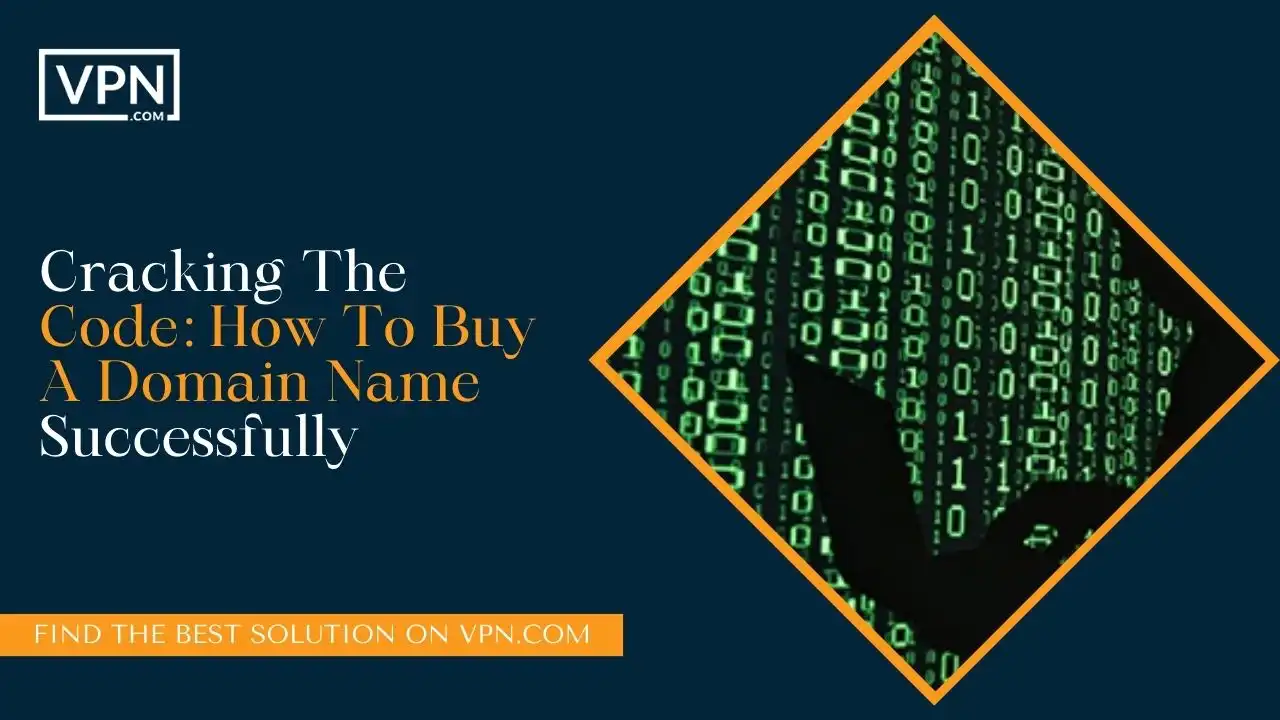
From multinational corporations managing hundreds of domains globally to freelancers just establishing their presence – navigating the expansive domain name system landscape often feels overwhelming despite being a core foundation enabling all websites and digital communication. This becomes particularly apparent when trying to buy a domain that aligns with your brand’s needs.
With over 330 million internet domains registered already and desirable .com name availability shrinking daily, simply identifying viable options matching brand or messaging intentions proves challenging. Before even considering budgets or on-page optimization, excelling online starts with a domain people can find and remember. The journey to buy a domain that resonates with your audience is critical.
This article breaks down what buyers need to know, including how much it costs to buy a domain name before that crucial first purchase and how firms like VPN.com are helping both small and large-scale customers confidently crack the code for acquiring domain names.
What Is A Domain Name?

A domain name is an address you type into your web browser to go to a website, like wikipedia.org or google.com. Under the hood, websites run on servers that have unique numbers to identify them called IP addresses. But those number mixes are super hard to remember!
So, the domain name system was created to give each server an easy-to-recall word-based name to use instead. The .com, .org, or .net endings are called top-level domains, while the words make up the actual domain name itself.
Together, domains act kind of like your postal mailing address, telling a request submitted from your web browser: “Hey, go fetch what the user is looking for from this specific server location.” That allows you to access the website you want by typing something simple instead of trying to remember complicated number codes. The domain name translates what you type into the matching server address automatically behind the scenes!

Sign up with our #1 choice
- Experts in Premium Domains
- Ultra-Secure Transactions
- Commissions Starting at 15%
- Paid $1m for VPN.com
- Only Pay When We Succeed for You
- Completely Confidential Transactions
Why Does Your Domain Name Matter?
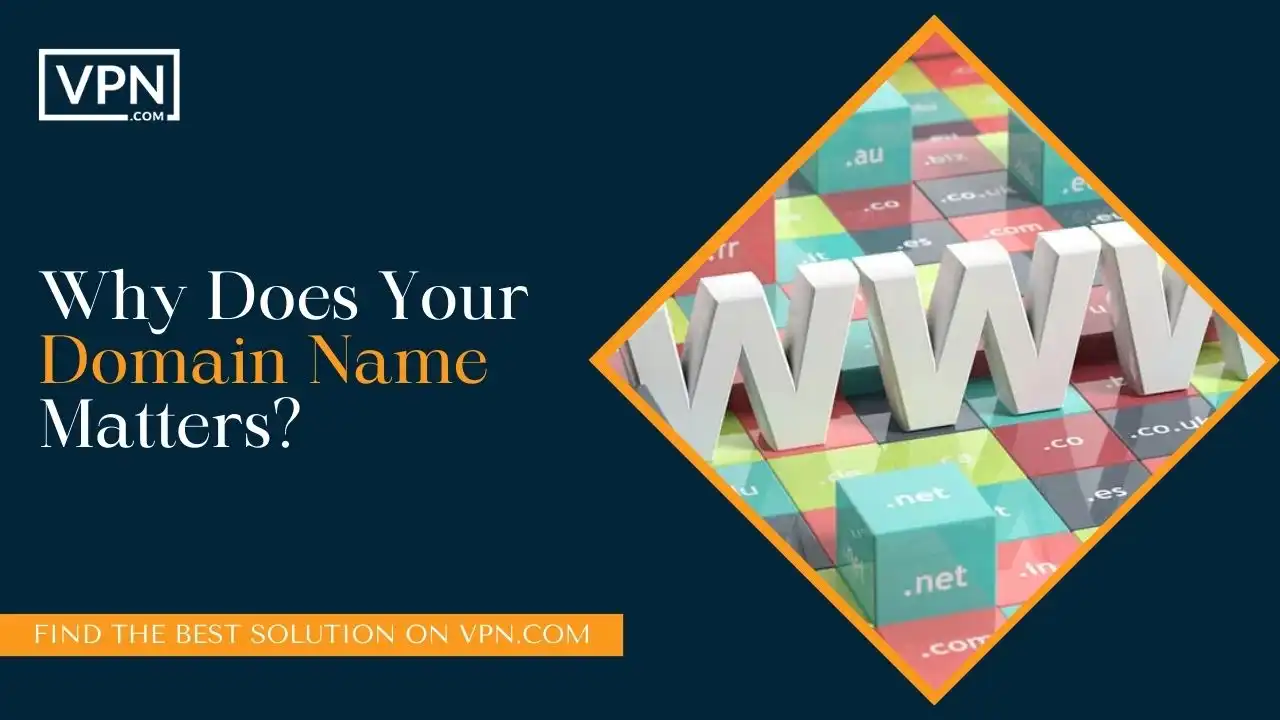
Domain names make a bigger impact than most people think. More than just helping websites get found by users, domains tell search engines what businesses focus on and remember branding for customers in their brains.
For these reasons, companies that master picking descriptive, appealing names unlock a great advantage online that plays out in a few powerful ways.
More Than Simple Navigation
A domain name may seem like a basic website navigation mechanism externally, but it makes or breaks customer acquisition attempts before most marketing even has a chance.
The associations and brand recognition generated within those first milliseconds of a potential visitor typing in a site link create an immediate, subconscious impression that shows experiences ahead, regardless of how strong backend offerings may be.
Predicting Successful Marketing
Choosing catchy and descriptive domain names is really important for marketing success in competitive online spaces, especially when you decide to buy a domain that aligns with your marketing strategy. If your domain name clearly shows what your business offers or does, it helps visitors understand right away. This step is crucial when you’re in the process to buy a domain that stands out.
Easy spelling and word choices also make it easier for people to remember your website later. This becomes even more powerful when your domain name matches your message across different platforms like social media or email campaigns. If your domain name is hard to remember or understand, you are missing out on a chance to show people why your solution is better than others.
Reinforcing Positioning Prominently
An implicit principle in conventional marketing is repetition – hearing the same associations repeatedly builds familiarity over time, incrementally shifting buying preferences.
Using domain names that clearly state what you offer sets a strong foundation for reinforcing your brand message from the start of every user’s journey. This reinforcement builds up over time, even with less frequent interactions, guiding visitors to naturally gravitate towards your offering when it matters most.
What Are Factors to Consider Before Buying a Domain?
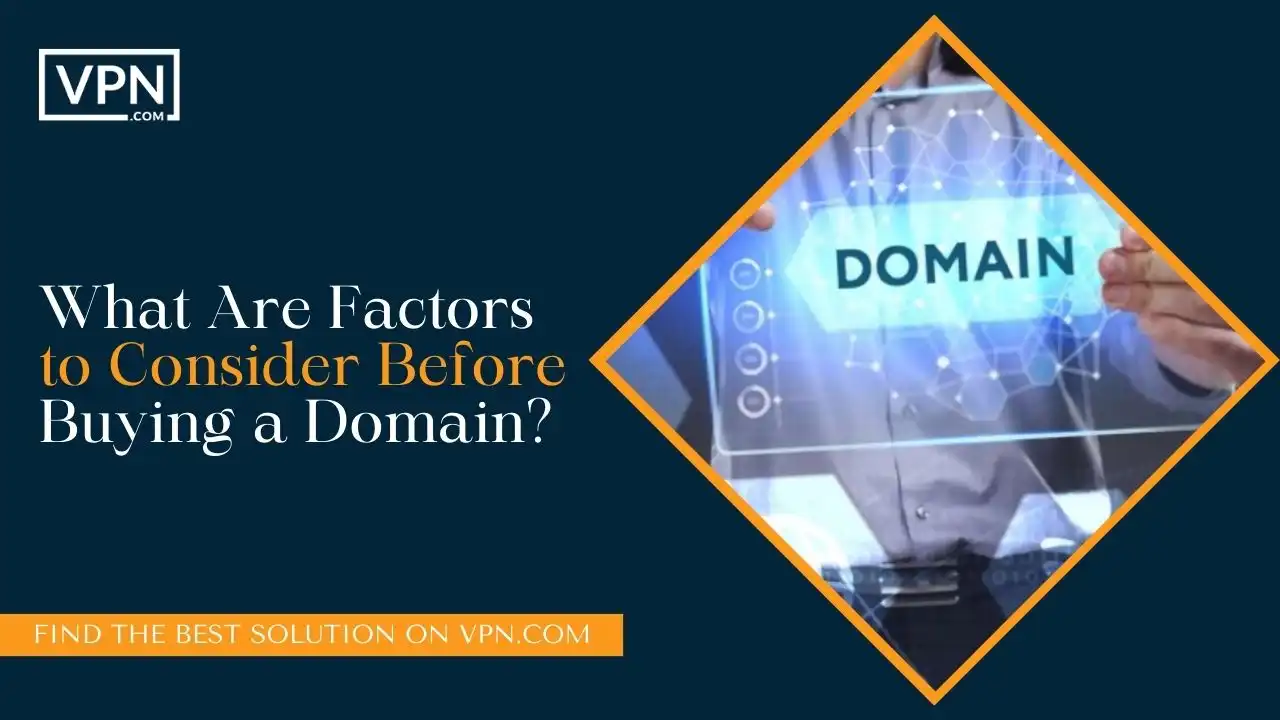
Factors include checking domain availability, considering the length and memorability of the domain, understanding the commitment timeframe for domain registration, comparing the cost of different domain pricing tiers, and estimating future traffic volume projections to ensure technical and budget alignment.

Sign up with our #1 choice
- Experts in Premium Domains
- Ultra-Secure Transactions
- Commissions Starting at 15%
- Paid $1m for VPN.com
- Only Pay When We Succeed for You
- Completely Confidential Transactions
Checking if the Domain You Want is Available
Searching to see if the domain name you like is still available or not is the very first thing to do. Registrar websites let you type in a domain and will immediately tell you if someone has already bought it or if it is free to register yourself.
This domain check only takes a few seconds. If your preferred name is already owned, try adding extra words or letters until you find an available option that describes your brand well enough.
Evaluating the Domain Name Length You Need
Short domain names are much easier for people to recall and enter without mistakes. Names using fewer characters help with branding and catchier better. But adding more words to domain names sometimes allows you to get exact product or service keyword phrases matched.
Marketing uses like putting the domain on flyers or business cards requires short. At the same time, longer internal development site addresses are not shared externally as much. Check how your customers and employees will mostly apply the domain as part of your evaluation.
Understanding the Owning Commitment Timeframes
When registering a domain, you must choose how many total years you want to keep it for – usually between 1 and 10 years to start. Going with a short one-year registration first lets you test out website ideas without long-term financial promises upfront you could later regret.
Think realistically about how long your brand or project may last relevant when picking durations. Committing to a 10-year domain registration right away, without knowing if your business will succeed, might end up being a waste of money if you close down earlier than expected.
Comparing the Cost of Domain Pricing Tiers
Domain name prices change depending on if you choose .com, .net, .org, and other extensions – .com is the most in demand. How many total years you register for also impacts cost, with longer periods normally cheaper yearly. Additional computing power for your site adds monthly fees, too.
Create a spreadsheet detailing options across extensions you would accept, years registered from 1 to 10, and estimated power needs based on expected visitors to understand total affordability before buying to fit your project budget.
Estimating Future Traffic Volume Projections
Take time upfront to guess how many visitors your website will attract monthly. Think through marketing plans across channels like social media, search engine optimization, and email outreach to set realistic goals for driving traffic. Higher visitor numbers mean needing more server capacity and computing ability, which charges subscriptions more.
Overestimating traffic makes you overpay, while underestimating risks poor website performance. By planning expected volumes carefully early when buying domains, you make sure technical needs and budgets align well.
How to Buy a Domain Name?
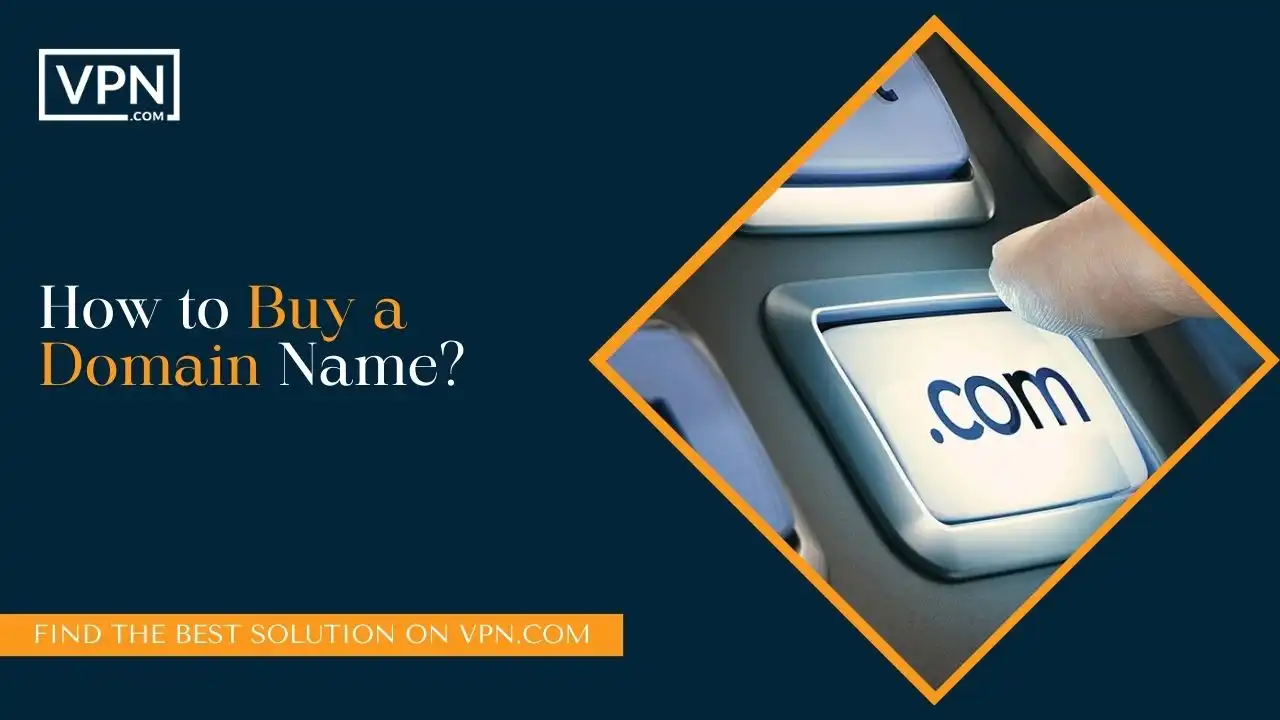
Comparing Domain Extensions
Several top-level domain (TLD) extensions exist beyond .com that provide alternatives at times when preferred names are already registered. Comparing benefits between .com, .net, and .org more narrowly and options like .io and .co more broadly significantly expands choice pools. However, .com domains maintain dominance given legacy market associations.
Testing Availability Instantly
Specialist domain registrars and marketplaces like VPN.com offer free real-time domain search tools testing millions of TLD combinations instantly when inspiration strikes to identify viable available names for registering. More advanced searches evaluate taken domains listed for sale, estimate valuations based on metrics like traffic, and highlight risks around trademarks infringed.
Understanding Registration Duration
When you register a domain then, you are essentially buying the rights to use it for a certain period, usually a year. You can also choose to buy it for multiple years, which helps secure the name for a longer time and prevents competitors from taking it.
The cost increases with the duration of registration. It is often a good idea for new domains to start with yearly plans. Then, they can reevaluate later based on website traffic and changes in strategy to find the best balance between owning and renting.
Comparing Registration Cost
Registration itself costs just $8-12 per year, typically through resellers. However, more desirable inventory is sold at higher premiums by aftermarket domain investors and brokers based on supply and demand around keywords driving buyer competition – making certain names highly coveted assets. DNS configuration work adapting sites technically also incurs additional fees.
Identifying Miscellaneous Fees
Other charges like DNS hosting enabling domain masking and redirecting along with SSL encryption for transmitting data securely on sites can add monthly fees needing consideration before committing to names. Identifying projected volumes informs appropriate tiers, balancing capabilities with costs.
Streamlining Process Complexity
The process of searching for available domains, comparing different types of domain endings (TLDs), handling yearly payments, setting up DNS configurations, and ensuring technical performance can get complicated quickly.
Domain registration resellers like VPN.com offer all-in-one solutions where you can purchase domains, set up DNS hosting, create email accounts, manage SSL certificates, and track website analytics, all from one account, without needing advanced technical skills.
How To Optimize Your Domain for SEO?
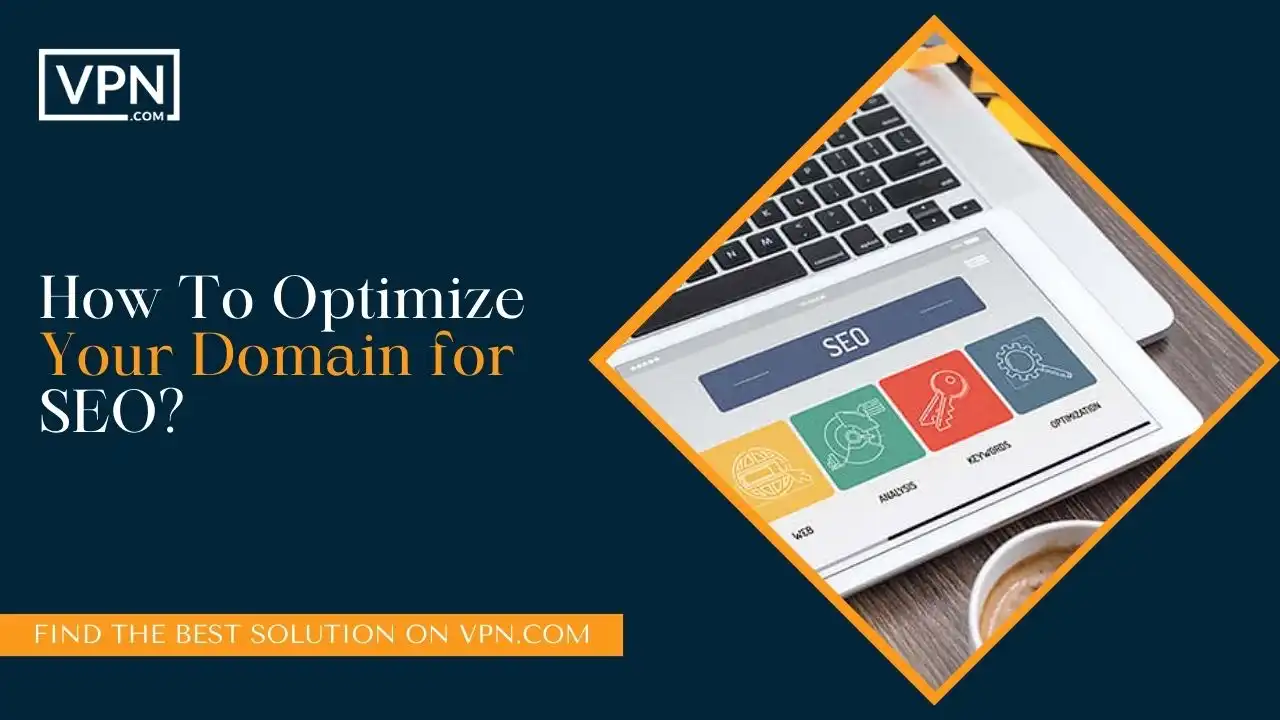
Optimizing a domain for SEO includes choosing a name with relevant keywords, considering the domain’s age, driving referral traffic through content sharing and backlinks, and interlinking with other owned domains to establish relevance and authority in search engine rankings.
Researching Keyword Relevance
Ideally, purchased names themselves contain strong keywords representative of primary topics a brand wants to rank for on search engines and be found around. If additional domains get bought later, interlinking these properties shows search bots about relevance hierarchies, helping index sites better.
Monitoring Site Age
On search engines like Google, domain age contributes toward authority and trust used in ranking pages higher for relevant searches. Ongoing content creation focusing on topics you want to be associated with a domain further builds relevance over time – which transfers across owners when names change hands in aftermarket sales.
Driving Referral Traffic
Creating content that people want to share and sharing links leading back to your website on social media platforms helps increase referral traffic. This exposes new audiences to your brand naturally, helping to grow overall awareness. Building links with other trustworthy websites also tells search engines that your site is popular.
FAQs
What Determines Premium Domain Value?
Multiple factors create high domain valuations, including name length under 3 words, namespace alignment conveying clear meaning, web traffic metrics, backlink authority indicating trust, registration duration security, market competition, and previous aftermarket sale prices setting expectations.
What is Domain Appraisal and How Does it Work?
Domain appraisals estimate market value benchmarking properties against recently sold comparable domains sharing similar attributes. Appraisals evaluate metrics like monthly search traffic, Google authority rankings, linking domains pointing in, exact match anchor text uses, and search engine indexing, which all feed predictive valuation models.
What Does it Mean to Make an Offer on a Domain?
Naming marketplaces allows buyers to enter proposed offer amounts on domain listings, indicating interest in negotiating an acquisition deal with sellers. Successful offers must provide enough incentive to elicit the owner to relinquish rights. Buyers can reference appraisal estimates and recently sold listing prices when structuring competitive offers.
What Should You Budget for Domain Acquisition?
Domain name budgets shift drastically based on intent, from just $20 per year protecting personal brand names to $50k and way above for commercial sites pursuing high-value keywords in top TLDs like .com. Presearch intent, appraisals of desired names, and monitoring recent aftermarket sales inform sensible budget levels, aligning available investment to likely deal requirements.
Which Tools Provide the Best Brand Protection Services?
Services like DomainsBot perform domain availability searches and then continually monitor identified names, sending real-time alerts if any changes or new registrations occur so buyers can respond, protecting brands. They also suggest available alternative names closely mirroring inputs securing critical namespace alignment.
How are Domain Transactions Safely Facilitated?
Domain aftermarketplaces streamline connecting buyers and sellers and then facilitate safe transactions through service escrows, which require buyer funds to be held securely with third parties until all transfer paperwork is finalized. This protects both sides, unlike risky direct peer-to-peer payments that are vulnerable to fraud and non-delivery.

Sign up with our #1 choice
- Experts in Premium Domains
- Ultra-Secure Transactions
- Commissions Starting at 15%
- Paid $1m for VPN.com
- Only Pay When We Succeed for You
- Completely Confidential Transactions
The Bottom Line
It’s worth learning or getting help speeding up parts of the process like checking availability across name options, comparing pricing of domains, moving ownership legally to you, and connecting website technology behind the scenes through “DNS.” This is crucial when you decide to buy a domain. Together, this is known as domain acquisition, a key step when you’re looking to buy a domain.
Companies like VPN.com shine by guiding customers through the complex world of domains simply as their entire focus. They bring expertise on everything from registrations, brokers, markets, payments, configurations, and more so you can focus on your business growth exclusively.
By having specialists handle the domain complexities behind the scenes, website owners are free to produce great content and visitor experiences supporting customer acquisition goals rather than technical domain details. Making the right first impression happens fast the moment potential customers type your name in. An expert domain acquisition process makes entering the digital world smooth.

![Cracking The Code: How To Buy A Domain Name Successfully In [month_year]? 6 Fox News](https://cdn.vpn.com/wp-content/themes/VPN/images/media-logos/Fox_News_Channel_logo.svg)
![Cracking The Code: How To Buy A Domain Name Successfully In [month_year]? 7 Yahoo](https://cdn.vpn.com/wp-content/themes/VPN/images/media-logos/Yahoo_logo.svg)
![Cracking The Code: How To Buy A Domain Name Successfully In [month_year]? 8 Bloomberg](https://cdn.vpn.com/wp-content/themes/VPN/images/media-logos/Bloomberg_logo.svg)
![Cracking The Code: How To Buy A Domain Name Successfully In [month_year]? 10 MarketWatch](https://cdn.vpn.com/wp-content/themes/VPN/images/media-logos/MarketWatch_logo.svg)